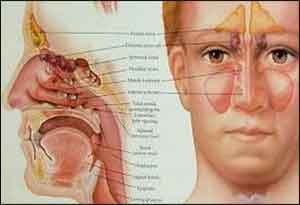- Home
- Editorial
- News
- Practice Guidelines
- Anesthesiology Guidelines
- Cancer Guidelines
- Cardiac Sciences Guidelines
- Critical Care Guidelines
- Dentistry Guidelines
- Dermatology Guidelines
- Diabetes and Endo Guidelines
- Diagnostics Guidelines
- ENT Guidelines
- Featured Practice Guidelines
- Gastroenterology Guidelines
- Geriatrics Guidelines
- Medicine Guidelines
- Nephrology Guidelines
- Neurosciences Guidelines
- Obs and Gynae Guidelines
- Ophthalmology Guidelines
- Orthopaedics Guidelines
- Paediatrics Guidelines
- Psychiatry Guidelines
- Pulmonology Guidelines
- Radiology Guidelines
- Surgery Guidelines
- Urology Guidelines
Blocking sweet taste receptors can help body fight sinus

A study has recently found that by blocking sweet taste receptors, one can help the body fight off sinus infections.
According to University of Pennsylvania's school of medicine researchers, bitter taste receptors in the upper airway are a first line of defense against sinus infections, but their ability to kill harmful toxins and pathogens is blocked when the sweet taste receptors are also stimulated.
While glucose and other sugars are known to trigger these sweet taste receptors, researchers have now shown amino acids can also have that effect.
This new understanding could help pave the way toward new treatments for chronic sinus infections.
The clinical name for chronic sinus infections is rhinosinusitis.
Previous research at Penn has suggested that a novel way to treat these infections involves manipulating the nasal bitter and sweet taste receptors.
Bitter receptors release small proteins called antimicrobial peptides, which kill bacteria, viruses and fungi that enter the nose, while sweet receptors normally activated by sugar found in mucus control the rate at which those peptides are released.
This new study shows the sweet taste receptor, known as T1R, can also be activated by certain amino acids secreted by bacteria.
They took cells from rhinosinusitis patients and isolated the various communities of bacteria that were present.
They found cultures of Staphylococcus bacteria produced two D-amino acids called D-Phe and D-Leu, both of which activate T1R sweet receptors and block the release of antimicrobial peptides.
"These amino acids, which come from Staphylococcus bacteria, block the body's natural immune response by essentially hitting the breaks on the defensive bitter taste receptors," said the senior study author Noam A. Cohen.
The researchers are developing such a therapy, and a patent on their work is pending.
The research appears in the journal Science Signaling.

Disclaimer: This site is primarily intended for healthcare professionals. Any content/information on this website does not replace the advice of medical and/or health professionals and should not be construed as medical/diagnostic advice/endorsement or prescription. Use of this site is subject to our terms of use, privacy policy, advertisement policy. © 2020 Minerva Medical Treatment Pvt Ltd